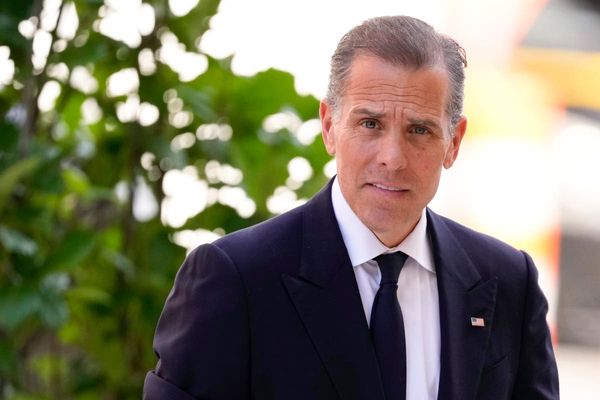
Sam Taylor, 53, was living in rural France with four well-received novels to his name when he realised that he wasn’t going to be able to support his family through writing alone. After being turned down for bar work in nearby Lourdes, he decided to try literary translating, starting with Laurent Binet’s Goncourt-winning novel HHhH. So began an award-winning second career that has seen him work with high-profile authors including Leila Slimani and David Diop. Now based in Texas, he has returned to novel-writing with The Two Loves of Sophie Strom. Centring on a provocative idea, it opens in 1930s Vienna as antisemitic neighbours torch 13-year-old Max Spiegelman’s home. In a parallel universe, the fire leaves Max an orphan, and he’s adopted by an Aryan family who rename him Hans and encourage him to join the Hitler-Jugend. At night, Max and Hans, on opposing sides of history, dream of each other’s lives.
Where did the idea come from?
Weirdly enough, the spark came from a line in my first novel [The Republic of Trees, 2005], about the night self and the day self, the waking self and the sleeping self. It’s sliding doors, except the twist is Max and Hans are dreaming about each other, so they’re aware of each other’s lives.
Why did the 1930s and the war appeal?
I needed a setting that offered a sharp contrast in possible fates for the protagonist, and a Mischling [Max’s father is Jewish, his mother Aryan] in the Third Reich gave me that. The war provided me with conflict, dramatic change, and the possibility that my characters could inhabit the same city while also living in very different worlds.
An intriguing aspect of the book is how Hans and Max are on opposite sides of history, yet compelled to experience each other’s point of view.
One of the book’s themes is that idea of trying to find some common ground, to bridge a gap. At the moment, it’s a time in history when the gap seems pretty big. I live in Texas, where probably 80% of the population is conservative and Christian. You meet them and they seem absolutely lovely people. If you started talking about politics, I’m sure they would be Trump supporters. To me, that’s almost physically repulsive, but they are absolutely certain that they’re the good guys.
How come it’s been so long since your last novel, 2009’s The Island at the End of the World?
I wrote a different book first – a science-fiction YA novel. All the feedback was that the dream idea was strong, [but] I should make that the only non-real element. It took me a long time to figure out how I could set it in the real world, but in the meantime I got divorced, remarried, had another son, moved to the States, and translated about 50 books.
The first novel you translated was Laurent Binet’s HHhH (published in 2012). Were you surprised by its success?
I’ve been way luckier as a translator than as a writer. HHhH was the first novel I was asked to read when I started trying to get into translation and I read it in 24 hours. It’s partly a kind of second world war derring-do novel – it’s very driven by narrative but it’s postmodern and witty. Laurent is probably my favourite novelist in translation.
How does translating a book change the reading experience for you?
It’s like X-raying a book; you get a very deep tissue read. I did an event with Leila Slimani where she said she thought her translators know her better than her family. She puts most of her consciousness and her life into her books, and we translators are more connected to them than anybody else. There is something to that.
Would you rather be writing fiction or translating?
At the time I started translating, I’d realised I wasn’t going to be able to make a living as a writer, so it saved my career, but I love writing. I know a lot of writers don’t and maybe I loved it less when it was all I did, but having come to the point where most of my time is spent translating, writing is like freedom. Did you watch Mr Benn? I have this memory of all those different lives he could live, all those different things he could be. I always wished I could try out more in my life, and writing is a way of doing that – of living lives in different places in different times.
You’ve kept your British accent but has living in America inflected your written English?
I feel like I’m bilingual in English – I hope there’s no blurring in between. Probably half the books I translate are into American English and I still have to ask my [American] wife occasionally “How do you say that?”
What books are currently on your bedside table?
Ovid’s Metamorphoses, A Year to Live by Stephen Levine – he’s a Buddhist, and he’s trying to live as though it’s his last year of life – and I’m rereading Maggie O’Farrell’s Hamnet. I spent the first four months of this year reading Philip Kerr’s Bernie Gunther novels, so it’s probably not a very good example of what I tend to read. I’ve never liked the distinction between commercial and literary fiction. What I want is good writing, really strong characters and a really good story.
Is there a book you regularly return to?
The novel I’ve reread the most is The Secret History by Donna Tartt. I don’t like her other books much but as soon as I pick it up it draws me back in again. It’s one of those novels that make me feel like I’m living in it when I read it.
The English-speaking world publishes notoriously low rates of literature in translation. Can you name a book that hasn’t been translated and should be?
Part of that is because there are so many books written in English but I don’t think it’s hopeless; translation has become more prominent in the last 10 years. One of my favourite authors is Hubert Mingarelli. He’s got a big back catalogue and there’s one novel in particular called Une rivière verte et silencieuse that I absolutely love and really want to translate.
What will you translate next?
The second novel by Victor Jestin, whose debut, Heatwave, I loved. That was a sensual, mesmerising account of a few days in the life of an alienated teenager at a horrifically cheerful holiday camp. I haven’t read the new one yet, but I’m excited to find out what Victor has come up with.
The Two Loves of Sophie Strom by Sam Taylor is published by Faber (£18.99). To support the Guardian and Observer order your copy at guardianbookshop.com. Delivery charges may apply







